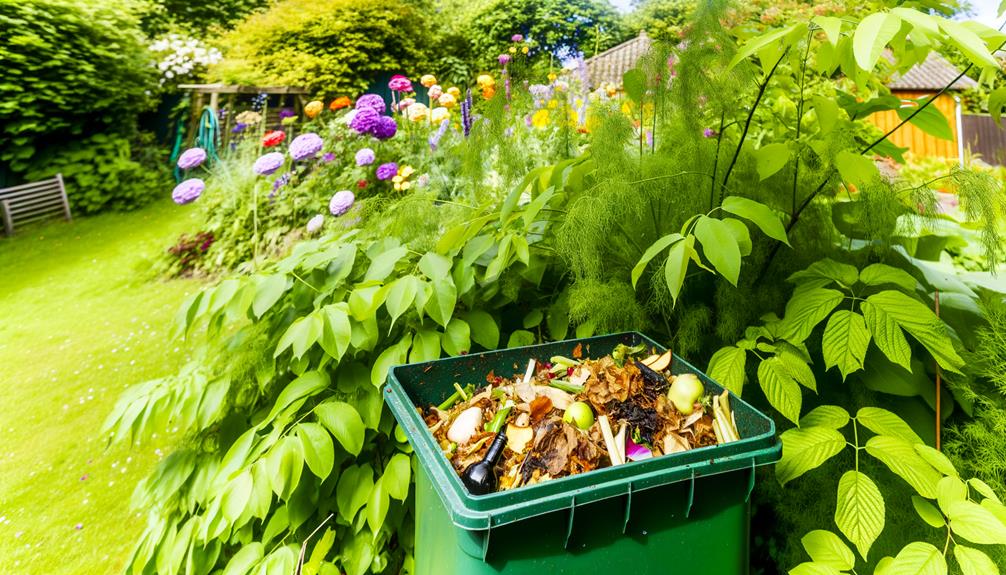

You can compost alcohol, but you need to be cautious. Small amounts of beer or wine can be added directly, mixed well with dry materials. Spirits should be diluted with water at a 1:10 ratio before adding. Alcohol can be toxic to microbes, slowing down composting, so avoid large quantities. Keep your compost balance with green and brown materials, turning it regularly for aeration.
Use alcohols with fewer chemical additives, like organic wines or craft beers. Monitoring the compost pile’s moisture and temperature will help maintain a healthy environment for microorganisms. Understanding these practices will enhance your composting process.
Understanding the different types of alcohol you’re dealing with is crucial when composting. Beer and wine are generally less potent and may decompose differently compared to spirits and liquors, which have higher alcohol content.
Knowing these distinctions helps you manage the composting process more effectively.
Both beer and wine, two of the most commonly consumed alcoholic beverages, can be effectively composted under the right conditions. During the fermentation process, both drinks develop organic compounds that break down easily in a compost pile.
To compost beer and wine, you should pour them in small amounts to avoid over-saturating the pile. It’s best if they’re mixed with dry materials like leaves or cardboard to balance moisture levels. Here’s a quick guide:
Step 1: Pour small amounts of beer/wine
Step 2: Mix with dry materials
Step 3: Turn the compost regularly
Step 4: Monitor moisture levels
Step 5: Allow time for decomposition
Following these steps guarantees your alcohol composts efficiently and enriches your soil.
Spirits and liquors, such as vodka and whiskey, can also be composted, but they require more caution due to their higher alcohol content. When composting these, you should be aware of the fermentation process and distillation methods used to create them. The high alcohol concentration can harm the microbes essential for composting.
To mitigate this, dilute the spirits with water before adding them to your compost pile. Start with a small amount and observe how your compost reacts. Avoid pouring large quantities in at once, as it can slow down the decomposition process. Always balance the addition of spirits with ample green and brown materials to maintain a healthy compost environment.
Also Read: Can You Compost Agave?
Alcohol in compost can greatly alter the activity and diversity of microorganisms. It affects microbial health, disrupting the balance needed for effective decomposition. Alcohol can inhibit the growth of beneficial bacteria and fungi, slowing down the decomposition rate. When microorganisms struggle, organic matter breaks down more slowly, affecting the overall compost quality.

To better understand the impact, consider these points:
For best composting results, avoid introducing large amounts of alcohol. Instead, focus on maintaining a balanced, healthy environment for microorganisms to thrive.
To maintain a healthy compost, you need to understand how alcohol impacts microbial activity.
Proper dilution techniques are essential, as too much alcohol can harm the beneficial microorganisms in your compost.
Make sure you balance alcohol content carefully to promote efficient composting.
Balancing alcohol levels in compost is essential because excessive amounts can hinder microbial activity. Alcohol, while a byproduct of the fermentation process, can disrupt the balance needed for effective composting. Microorganisms that break down organic matter can be sensitive to high alcohol concentrations, leading to a slower decomposition process.
You need to manage alcohol content carefully to maintain a healthy compost environment.
Here are some key points to take into account:
Guarantee any alcohol in your compost by mixing it with water to prevent disrupting the microbial activity. Aim for a ratio of at least 1 part alcohol to 10 parts water. This helps maintain proper compost aeration and keeps the compost temperature stable. When you dilute alcohol, it becomes less harmful to the microorganisms that break down organic matter.
Here’s a quick guide:
| Alcohol (cups) | Water (cups) |
|---|---|
| 1 | 10 |
| 2 | 20 |
| 3 | 30 |
| 4 | 40 |
Make sure you mix thoroughly before adding it to the compost pile. Regularly turn your compost to enhance aeration, and monitor the temperature to confirm it stays within the ideal range of 104-140°F. This balance keeps your compost healthy and active.
Also Read: Can You Compost Your Cotton Swabs? (This Might Surprise You)
When composting alcohol, it’s important to know which types are safe to use without harming your compost pile. Stick to alcohols with minimal additives and lower chemical compositions. Some safe brands you might consider include organic wines, craft beers, and unflavored spirits. These types generally have fewer chemicals that could disrupt the composting process.
Here’s a quick list of safe alcohol types for composting:
Always check the labels of these products to make sure they don’t contain harmful preservatives or artificial ingredients. By choosing these safer options, you help maintain a healthy and effective compost pile.
To prevent overwhelming your compost pile, it’s crucial to dilute alcohol before adding it. Start by using a simple dilution ratio of one part alcohol to ten parts water.
This ratio guarantees that the alcohol won’t disrupt the microbial balance in your compost. Dilution benefits include reducing the risk of killing beneficial microorganisms and preventing unwanted odors.
Simply mix the alcohol and water in a container and stir thoroughly. For larger amounts, you might use a garden sprayer to distribute the diluted mixture evenly.
Always test small amounts first to gauge the impact on your compost. By following these dilution methods, you’ll effectively manage alcohol in your compost without causing harm.
Also Read: Can You Compost Bacon Grease?

You might be surprised by the many alternative uses for alcohol in your composting process. Instead of adding it directly to your compost pile, consider these options:
For successful composting, focus on maintaining a balanced mix of green and brown materials to guarantee efficient decomposition. Green materials include organic waste like fruit scraps and vegetable peels. Brown materials consist of dried leaves and cardboard. Using compost bins helps manage this balance and speeds up the process.
Here’s a quick reference table:
| Green Materials | Brown Materials |
|---|---|
| Fruit scraps | Dried leaves |
| Vegetable peels | Cardboard |
| Coffee grounds | Sawdust |
| Grass clippings | Shredded paper |
Keep your compost moist but not soggy, and turn it regularly to aerate. Avoid adding large amounts of alcohol, as it can disrupt the microbial balance. With these tips, you’ll create nutrient-rich compost efficiently.
To sum up, composting alcohol requires careful consideration. Stick to safe types like beer and wine, and always dilute them before adding to your compost.
Remember, balance is key—too much alcohol can harm the microorganisms that make composting effective. If in doubt, use alternative methods to dispose of alcohol.
With these tips, you’ll maintain a healthy compost and contribute to a greener environment. Follow these guidelines for successful and efficient composting.
